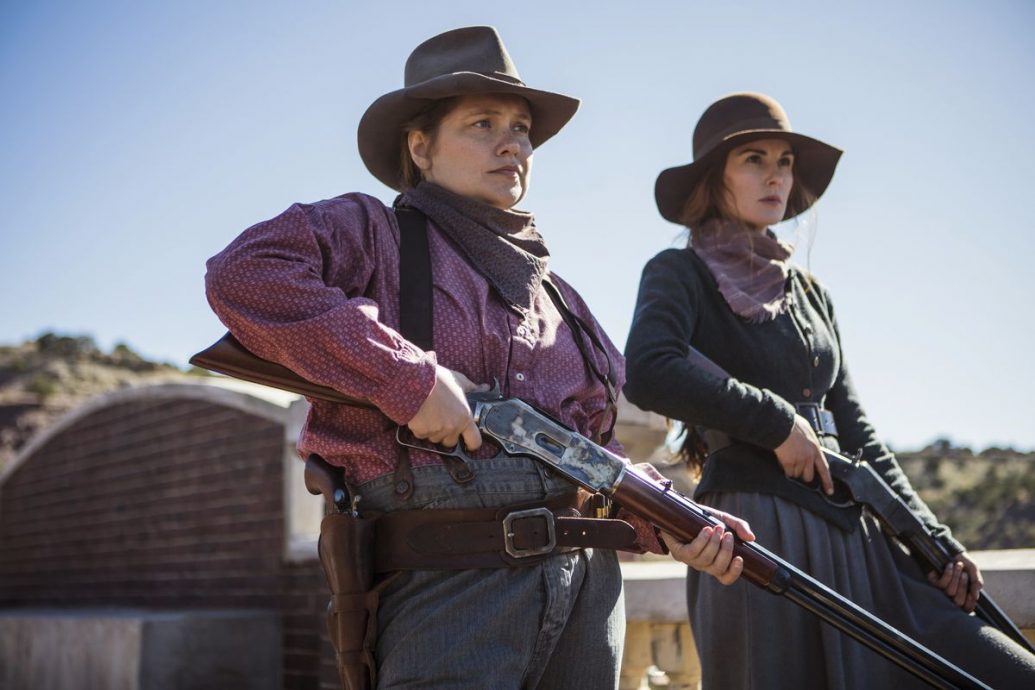He could be relied upon to explain clearly and patiently why there is something called Western Civilization and why it should be studied and bolstered.
Netflix Defends the West(ern)
Godless is not great, but it’s good. Netflix’s new television series enjoys every cliché of the Western genre: a train robbery, mustachioed marshal, prostitute with a heart of gold. Its recapitulation of the tradition manages to be quite contemporary because it touches on racial, feminist, and homosexual themes. Those with overactive PC-fighting antibodies might get hives, but fear not—the series affirms the Western tradition, in its adaptability, as worthy of armed defense. It’s also visually beautiful and just fun.
The story arc follows Roy Goode (Jack O’Connell), a gunfighter trying to give up that way of life. He rides onto the ranch of widow Alice Fletcher (Michelle Dockery), who shoots him before nursing him back to health. George Stevens’ 1955 classic Shane—with a dark hero saving a community he cannot join—looms large as an influence. Like Shane, Roy becomes an object of attraction for the woman in whose barn he sleeps and a manly model for her son, Truckee (Samuel Marty). And, like Shane, he’s destined to use the skills from his violent past to defend the good guys before riding on.
The threat is Frank Griffin (Jeff Daniels), a charismatic gang leader promising to slaughter down to the last child any community that harbors Roy, a defector from his crew. By taking Roy in, the widow Fletcher has endangered all of La Belle, already a vulnerable town. The able-bodied men of La Belle died two years earlier in a mining accident, leaving scores of women, and a few men, to scrape by. Their would-be protector—hapless Sheriff Bill McNue (Scoot McNairy), who is courageous but depressed and increasingly blind—inspires more ridicule than confidence. The women of La Belle have adapted. They carry guns, manage the business of the town, and convert the brothel into a school.
Catherine Pearson calls it “a nostalgic return to the classic Western aesthetic but with an exciting modern twist.” The quasi-matriarchal situation in La Belle has drawn attention to Godless as “a feminist Western.” Caroline Framke writes: “Watching La Belle’s widows take control of their own lives as they navigate the sexist bullshit of their era—which is both routine and terrifying—is the most interesting aspect of Godless by a mile.”
The feminism of the film is complicated, however. When Alice Fletcher wants to break her horses, Truckee advises against it, since Roy isn’t around to help. “We don’t need anybody,” she says. We watch her fail and then get Roy. Mary Agnes McNue (Merritt Wever), widow of the mayor and sister of the sheriff, is the townswomen’s de facto leader, urging them to maintain half ownership of the silver mine. But the women, ambivalent about their manlessness, accept the company’s buyout. In the inevitable final shootout, although the women fight well against Griffin’s gang, the sheriff and Roy ride in to save the damsels in distress.
Thus many feminists are unsatisfied. Anne Cohen whines that the show, a “missed opportunity,” fails “to deliver on the feminism” and “still relies on toxic masculinity to move the plot along.” Sure the women have adapted, but when “the big bad mining company buys out their claim,” Cohen complains, “they submit.”
That’s not quite adequate. Mary Agnes is determined that she and her “sisters” be independent agents. The women vote instead to get “the money and the men” back quickly. The series here resists an unrealistic celebration of self-assertion to instead give us an insight: People often prefer not to adapt. Faced with drastic change, many seek refuge in the comfortable. We change in response to challenges, but change itself is challenging, so the West, the land of opportunity, is also a land of difficulty.
Mary Agnes’ brother Bill also has trouble adapting—scorning the eyeglasses that would ameliorate his blindness, for example. Bill mocks Mary Agnes for wearing her dead husband’s clothes: “You ever worn a dress, Bill?” “No, and neither do I intend to,” he responds. This time the predictable reaction comes from the Right. James Delingpole wants to know,
did we really have to have a scene where the tough, possibly lesbian girl who decides she would much rather dress as a man than as a woman taunts one of the male characters for never having experimented with wearing a dress. This is the 1890s Wild West, for heaven’s sake, not a gender-neutral toilet facility on Yale campus last week.
That may seem right, but actually, it’s the 1880s, and Mary Agnes isn’t encouraging her brother to cross-dress. She’s only defending her practical shoes and slacks. The real point of the scene is to highlight Bill’s unwillingness to recognize and respond to the life he’s been given. Mary Agnes is in a situation that calls for some traditionally male behavior (she ain’t gonna hunt in a corset), and Bill is in one that calls for some feminine behavior. His wife died in childbirth. A single parent must manage to be both mom and dad, but this man cannot get himself to mother his children.
Where Mary Agnes represents resolute adaptation, Bill represents a stiffness destined for frustration. In this context, the townswomen’s decision about the silver mine constitutes not submission to the patriarchy but a penny-wise-pound-foolish desire (like Bill’s) to stay in the roles for which one has been prepared. It’s not that feminism and gay rights aren’t salient themes in Mary Agnes’ character. It’s rather that the series uses her character to emphasize that the West allows—and demands—that people adjust to life in ways not merely determined by tradition. The series seems to say: the West is a dynamic society that has, so to say, a tradition of adaptation.
By the same token, not everything is up for grabs here. What’s implied is that, true to the Western form, in order to meet the difficult situations they inevitably face, individuals need a context of law, leadership, courage, and community. This need becomes obvious in the shadow of a shared existential threat.
The town next to La Belle, which is populated by black Civil War veterans and their families, deliberates whether to defend La Belle against Frank Griffin’s gang. When a wife points out that, given past mistreatment, they don’t owe those white folk anything, her husband counters that the question is really how they will feel when all those women are murdered. Interrupting their conversation, Griffin settles the question by killing them all. Human decency and a shared need for law and order bind us, even when we are not indebted. Neither individuals nor communities can thrive where Griffin rules.
Jeff Daniels’ Griffin is a worthy and interesting villain. He began life as an orphan who was adopted by Isaac Haight after Haight and his band of religious polygamists killed some 120 nonbelievers at the Mountain Meadows Massacre (a real event that happened in the Utah Territory). Enamored of Haight’s idea that spilling “gentile blood” is salvific, Griffin has become a terrorist.
Mormonism is never named, which is good. Not only has the LDS Church been transformed since that 1857 massacre, but it should not be judged by the worst act of its history, perpetrated by renegades. More important for understanding the series, early Mormonism had some similarities with Islam: polygamy, most obviously, but also a founding prophet rewriting the Bible, and a theocratic tendency.
These similarities allow Frank Griffin to stand not for Mormonism but for today’s terrorists. (The story on which this show was based was written in 2002.) Today’s renegade Islamist gangs disdain our disordered and decadent Western society—with its liberty of women and of sexuality—as godless. They believe killing infidels is salvific, and they hate that some Muslims defect to our way of life. Amid all the (rather misplaced) celebration of a “feminist Western,” commenters have ignored its post-September 11, pro-Western theme.
A marauder dressed as a preacher, Frank Griffin has collected his crew from orphans and desperate men—mostly illiterate—and acts as their guru. He has taught his followers, and they repeat, “The Good Book says, the man who lies down like a lamb stays down.” Fact check: John 10 characterizes us as lambs for the Good Shepherd, but warns against thieving impostors and wolves.
Scooping up broken young men, providing them with livelihood, leadership, and loyalty, Griffin builds a faux family of absolute fidelity to himself. In shepherd’s clothing, he is a thief of the lost sheep in his group, a wolf to most others. His promise of complete care in return for loyalty is double-edged. As Mary Agnes says to the husband-hired Pinkerton searching for a runaway wife: “Safe is one of those funny words. Sometimes it means something different to the person who says it and the person who hears it.”
The mining company, which reneges on its promise of protection, represents the polar opposite community to Griffin’s—though not malevolent, it is an undependable alliance based only in temporary self-interest. As said also in John 10, the paid worker “does not really care for the sheep,” so “when he sees a wolf coming, he runs away.” In this context, La Belle is groping to build an in-between community, one in which people are simultaneously free and protected.
Every character in Godless is abandoned in some way; there are orphans and half-orphans, widows and widowers everywhere. The renegade main character, Roy, before being adopted by Griffin, had first been taken in by Lucy (Marceline Hugot), a kind religious woman running an improvised orphanage. This, the series suggests, is just the human condition, to be left to our own efforts.
The greatest abandonment is suggested by the show’s title. After a victim yells, “You are no man of God!,” Griffin answers: “God? What God? Mister, you clearly don’t know where you are. There ain’t no higher-up around here to watch over your young ’uns.” His speech retroactively illuminates the series-opening scene, in which his men annihilate a town called Creed, whose inhabitants are protected neither by the town’s faith nor its church. As usual, there is truth in what Griffin says, though he puts it to bad use. One of his men later parrots to him, “In the absence of God, it’s up to men like us to make the important decisions.” “Very good,” he responds. “The only thing a man can truly count on is hisself,” says another. “Amen,” he affirms.
With the massacre of Creed for context, the women of La Belle build a church and await a very tardy pastor from the East. Of course, none of that will protect them. Mary Agnes organizes the women to fight, and a lawman (her brother) and extra-legal muscle (Roy) must back them up. There seems not to be a good shepherd to protect us; the only thing we can count on is us.
That interpretation of the series is half right—as we can see by following a striking parallel with another old movie, The Night of the Hunter. In that 1955 classic directed by Charles Laughton and written by James Agee, a menacing Harry Powell (Robert Mitchum) dresses like a preacher and pretends to be the guardian of runaway orphans. These “little lambs” find shelter with the kind religious woman Rachel Cooper (the marvelous Lillian Gish), who takes in stray children like Lucy does in Godless.
The Night of the Hunter would be yet another anti-religious work about a false man of God preying on others, except that someone genuinely religious arrives midway through the film. Just as Powell’s distorted dogma is balanced by Cooper’s Christianity and courage, in Godless, Griffin’s violent creed is countered by Lucy’s gentle caritas and Mary Agnes’ mettle.
Griffin is right that there is “no higher-up around here to protect your young ’uns,” but there may be a Lillian Gish with a gun: “I am a strong tree with branches for many birds,” Gish’s Cooper says, as she arms herself to defend them. Both The Night of the Hunter and Godless underline that, here and now, while man remains an orphan, there’s nobody who doesn’t need anybody, and that the good should not lie down like lambs.
A verse from Matthew 7 opens the 1955 movie: “Beware of false prophets which come to you in sheep’s clothing, for inwardly they are ravening wolves.” According to Frank Griffin’s creed, the human world is forsaken and death “no big deal.” Roy proves him to be a false prophet and discovers—by learning to read for himself and by witnessing the fragile goodness of others—that life is a gift worth protecting and living nobly. A reborn Roy rides westward, to a new start.
Godless is a politically moderate, post-September 11 affirmation of a flawed but adaptable and dynamic American life. Its derivativeness proves a point: One can make a completely clichéd Western incorporating gay, feminist, and racial issues—not only without distorting the tradition, but while celebrating its armed defense.



